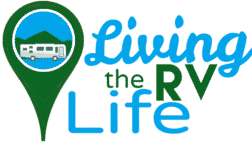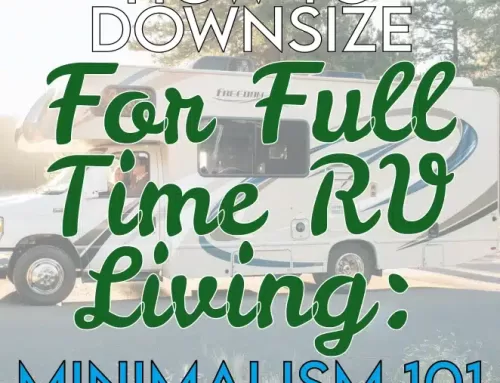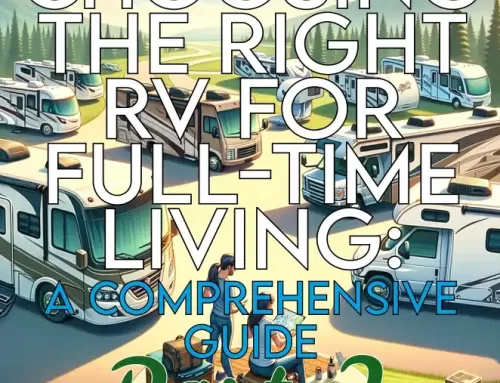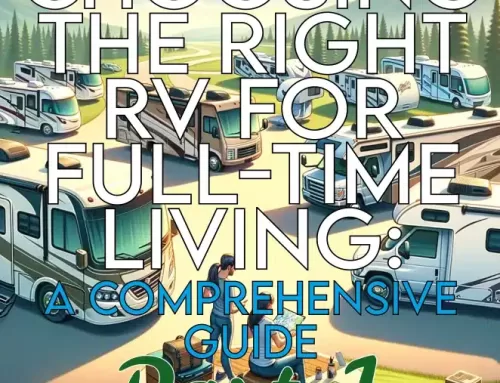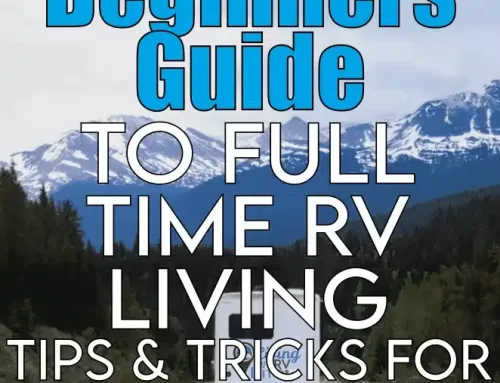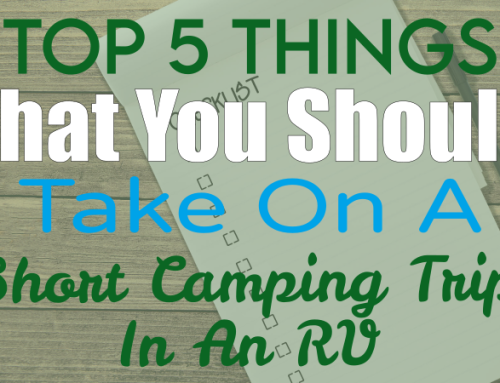 So, you have decided to “sell everything and buy and RV”. What’s next? If you are reading this page you’ve probably made that decision (and perhaps came to the realization that it’s a lot of work to get there). But you can relax. We’re here to help. We’ve been there and know a few things about downsizing and going mobile.
So, you have decided to “sell everything and buy and RV”. What’s next? If you are reading this page you’ve probably made that decision (and perhaps came to the realization that it’s a lot of work to get there). But you can relax. We’re here to help. We’ve been there and know a few things about downsizing and going mobile.
Now, you may find, as you start down this path, that it’s not the right fit for you. But that’s OK. It may not be the right fit for you right now, but it could be a year or two down the road. Or you may find it never is.
In truth, there are many reasons to live in your RV full time, and each reason is personal. There is no one “right” reason to live in your RV, just like there is no “right” way to do it. Some people can live just fine in their truck camper or van, while others need a large Class “A” motorhome to do it.
Some people like travelling while they live full time while many others just stay in one place, whether it is for work, or perhaps they just don’t like travelling as much. In any case, there is no right or wrong way to do this, and no right or wrong reason for doing it.
These are a few things we’ve learned that we want to share with you:
Tip #1 – Don’t rush out and buy an RV
If you already own one, then great. But you will likely find that, after spending more than weekends in your RV, you will find things you do like and things you don’t about your rig. But that’s ok! The whole idea of long term living in an RV is enjoying not only where you are parked, but what you live in.
That’s why we recommend that if you don’t own an RV already, rent one. In fact rent a few. Try them out to see what you like and don’t like. Try renting a few different models to see what you are comfortable with – both in living and driving/towing.
All to often you hear stories of people who “sell everything and buy an RV” and end up either giving up on their dream, or selling their RV within a few months or a year. This is because they didn’t account for full-time life when they purchased their rig.
Tip #2 – It’s OK to renovate your RV
As you spend more time in your RV you will undoubtedly find things you do like and things you don’t like. For example, while I love our Class “A” (It has almost everything we’ve been looking for in an RV) there are a few things I don’t like.
For example, it had a small TV that was above the cockpit between the driver and co-pilot. Aside from the fact that it’s a stupid location to put a TV because you are always craning your neck to see it, it was also an old tube type TV. When the RV was built it was the latest and greatest, but these days, flatter wider screens are the thing. So we repurposed the old TV compartment into storage and instead I built a wall mount for our larger flat screen and mounted it out of the way. It’s not visible at a better angle, and of course the bigger picture is nice :)
Similarly, in the fifth wheel we owned before this, we removed the dinette and some of the associated cabinetry around it as we found we didn’t sit down for dinner, we sat in our chairs, and watched TV or sat outside. So instead of dinette and cabinets we put in a small refrigerator, made a bed for our dog and I installed a small desk for me to use as I work from home.
Even a small upgrade like getting an upgraded RV mattress (our next purchase) can go a long way to improving your full time RV life.
Tip #3 – It’s not as easy as it may look
We know lots of people who think that all we do is camp every day. But living in your RV full time is not camping. It’s living, just in a smaller space. So while some people think you are “living the life” you soon may find out it’s not all it’s cracked up to be.
I remember in the middle of the night one night waking up to a hissing noise. It was pitch black in our trailer so I couldn’t identify where the sound was coming from. It wasn’t gas or propane, but it was something else.
As soon as my feet touched the floor and I felt a couple centimeters of water on the floor I knew what it was. In the middle of the night we had a water line split. So I had to quickly find some clothes so I could run outside and turn off the water. (Here’s a bonus tip – always use a pressure regulator on your waterline!)
So of course when we did get up the next day we had no water and I had to find a plumbing supply place that was open in the little town we were stopped in. Normally I might have had the supplies needed to make an emergency patch, but when the space in your RV is limited you have to be very particular about what you choose to pack.
But that’s not all. If you truly are going to live full time in your RV you have to consider what that living will look like all year round. Not just in the spring and summer. Winter’s in an RV can be brutal. What with frozen water lines, frozen holding tanks, appliances that quit. Running out of propane. These are all things that many full time RVers have had to deal with during the winter.
So just keep in mind that it isn’t “camping” it’s “living”. Just in a smaller scale than most people are used to.
Tip #4 – Research Research Research
You will find, as you start your new life, that there are many people who don’t like the idea of full time RV life. They may look down on you because of your choice in residential accommodations.
You will also find discrimination in some RV parks. Not against you personally perhaps, but against your RV. You see, some parks have age requirements for the rigs that pull in longer term. Some parks have “soft rules” where they get the final right of refusal for older RVs, while with some RV resorts it’s a hard rule. If your rig is more than 10 years old then you aren’t allowed to stay there.
We have come across RV parks that are like this – if your rig is older, you just don’t get in.
If you are travelling long distances you should also research your route. When we headed to Nevada a couple years ago from our home base in British Columbia, I poured over routes and even got an app called “Mountain Directory West” which not only lists all the routes in the Western United States, but also mentions elevations, and points along your route where there are steep grades, and other notes about the road/highway/interstate you are taking. This came in very handy for 1 particular stretch of interstate. It had a long steep grade to pull up. I remember it was pretty steep for 5 or 6 miles with no level places to catch your breath. So we parked our rig near it and took a trip up the hill to see what we thought of it. It turns out that it was an “RV killer” We saw more than 1 overheated semi, RV and regular vehicle pulled over on the side of the road.
Instead of attempting to pull that hill, we found an alternative route that actually had less traffic, was more scenic, and really only added ½ hour or so to our trip that day.
Tip #5 – Keep your spot tidy
When you are actually out on the road, and you are staying in various campgrounds and RV parks, always keep your spot tidy. It looks better for you, but it’s also the right thing to do with your neighbors. We’ve stayed in places where the neighbors spread out. They have tools, dogs (and their corresponding kennels) bikes, and so much more out there, you wonder how it all fits in their rig when they pull out. We’ve even stayed in places where there are large piles of “stuff” behind the RV with a big blue tarp thrown over it. People like that tend to get asked to leave fairly quickly, but sometimes not.
So for your own sanity, and that of your neighbors, don’t leave too much stuff outside. Aside from the chance of theft, it just doesn’t look nice.
Tip #6 – Take a Break Once in a While
One thing we’ve learned from our time in our RV is that you probably can’t spend every day in your rig. We try to take breaks every month or two. We pack up a suitcase and head to a hotel or a friends place for a night or two. This is particularly helpful in the winter when you are out of water due to frozen lines, or you get a particularly cold stretch of weather for a few days.
So in the winter, whether or not the weather is cold, we try and take breaks along the way. The best part of this is that this is also usually the hotel’s off season, so rates are much more reasonable. You can take a night or two, pack your bags (and in some cases your laundry if the hotel has a guest laundromat) and just get away. It’s a great way to recharge your batteries and help you get ready for what’s to come.
When we were in Las Vegas we did this quite a bit because you can get some really great deals on Groupon if you can stay mid-week for example. We were getting rooms for as little as $20/night plus resort fees and taxes. And in some cases, you will get free or cheap upgrades. I remember one particular stay at New York New York where we got a great deal on our room and only had to pay an extra few dollars to upgrade to a suite with a jacuzzi tub and a king size bed in a separate room.
Conclusion
As you can see, becoming a full time RVer can be difficult. Some people adjust well to small space living, but for others it’s too much of a challenge.
That’s why one way you might be able to transition into full time RV life is to do it over an extended period of time.
When we first started out we spent about 6 months full time in our RV. Our rig at the time was not cold weather friendly, so we couldn’t immediately move into full time RV life. But as time went on, and our RVs got better we were able to spend more and more time in them until we did start spending 12 months per year living full time in our RV.
And don’t beat yourself up if you find you just can’t take it. Full time RV life isn’t for everyone. There are some who DO spend 12 months/year in their rigs, moving from job to job or campground to campground, and there are just as many who stay in Canada in the spring and summer and head to the warmer states in the US in the fall and winter. Whatever works for you is best.
Remember, it’s about living your best RV life – even if that means leaving it behind from time to time.
